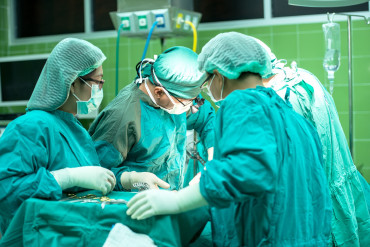How Does A Patient Get A Hospital-Acquired Infection?

Infections that occur in the hospital can be life-threatening. If hospital-acquired infections are not diagnosed and properly treated promptly, they may result in severe symptoms, long-term medical complications, organ failures, septic shock, and, ultimately death. That is why the policies and procedures in hospitals emphasize cleanliness and sterility in all surgical, treatment, examination, and patient rooms. It’s also the reason that healthcare professionals are required to wash their hands regularly and thoroughly. If they fail to do so, it puts patients’ lives at risk and can lead to medical malpractice lawsuits.
What Kind Of Infections Can You Get In A Hospital?
Hospital-acquired infections (HAI) are bacterial or fungal infections that develop in patients in a hospital setting. They are also called nosocomial infections. The transmission of HAIs usually occurs when medical staff doesn’t practice hygiene procedures correctly. However, other hospital negligence and product defects may also play a part.
Some of the most common types of hospital-acquired infections include:
- Ventilator-associated pneumonia
- Urinary tract infections
- Hospital-acquired pneumonia
- Staphylococcus aureus (Staph infections, including MRSA)
- Central line-associated bloodstream infections
- Surgical site infections
Many HAIs can be treated and do not result in long-term complications when detected early and treated correctly. However, hospital-acquired infections can progress very fast, especially if the patient has a compromised immune system weak from another illness or recent surgery.
What Causes Hospital-Acquired Infections?
Hospital-acquired infections can be caused in a number of ways, including:
- Medical devices – Numerous types of medical devices are used in hospitals to treat patients. These devices are required to be clean and sterile for the safety of patients. If hospital staff fails to keep medical devices sterile as required, they can quickly lead to infections, and the hospital may be held liable for patients’ damages.
- Building surfaces – The floors, walls, doors, and other hospital surfaces can be home to various types of bacteria if they are not properly cleaned and sterilized. This can pose a threat to the health of patients who come into contact with unclean surfaces.
- Water supply – Problems with the cleanliness of a hospital’s water system can lead to HAIs in patients. In this event, the hospital can be held responsible for negligence or malpractice.
- Iatrogenic factors – These factors involve the cleanliness of hospital staff when they are caring for and interacting with patients. The risk of infection is increased when the staff is performing intravenous procedures.
- Patient health – Patients’ overall health and the severity of their illnesses can also be a contributing factor in the likeliness of acquiring an HAI.
Why Are Hospital Acquired Infections So Dangerous?
When you acquire an infection in the hospital, it can progress quickly into a life-threatening situation. Untreated infections can become septic. Sepsis is a body’s response to infection that involves the bloodstream and may end fatally as septic shock. While most HAI cases are completely preventable with proper hygiene and device maintenance, sepsis and other complicating infections are among the leading causes of injuries and death following surgeries.
When Is A Hospital Or Medical Professional Liable For HAI?
Determining liability in hospital-acquired infection cases can be difficult, even when the patient has suffered serious injuries or death. Some cases of infection in a hospital setting are not a result of negligence by a medical professional or the hospital itself. Instead, they are simply a negative complication of an illness or procedure, even though they may be devastating. However, there are times when an HAI does develop as a direct result of medical negligence. A thorough investigation must be done to determine which is true in a specific case.
If it is found that the infection could have been prevented if the medical professional had not deviated from the standard of care, then you may be able to file a medical malpractice lawsuit against the medical professional, as well as against the hospital, office, or clinic where you contracted the infection.
Contact Our Experienced Medical Malpractice Attorneys In Pennsylvania
If you or a loved one acquired an infection while in the hospital that wasn’t properly diagnosed or treated, and you’ve suffered harm as a result, you must speak to an experienced medical malpractice attorney. Proving malpractice in HAI claims can be complicated, which is why Ross Feller Casey has expert physicians on staff to review your medical records.
Our medical malpractice lawyers are knowledgeable about HAIs, sepsis, and septic shock and are experienced in proving liability and negligence on the part of hospitals or medical professionals. We have a proven track record of winning large financial recoveries for clients just like you.
Call the offices of Ross Feller Casey for a free consultation with one of our medical malpractice attorneys. Our medical malpractice cases are handled on a contingency basis, so you don’t have to pay anything until there is a financial recovery.
Disclaimer: Ross Feller Casey, LLP provides legal advice only after an attorney-client relationship is formed. Our website is an introduction to the firm and does not create a relationship between our attorneys and clients. An attorney-client relationship is formed only after a written agreement is signed by the client and the firm. Because every case is unique, the description of awards and summary of cases successfully handled are not intended to imply or guarantee that same success in other cases. Ross Feller Casey, LLP represents catastrophically injured persons and their families in injury and wrongful death cases, providing legal representation in Pennsylvania and New Jersey.




